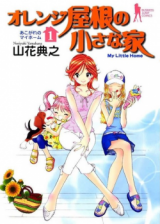I started reading this because the bits of art I'd seen were pretty cute, and the summary piqued my interest. I continued reading because of the cute art and wondering how the main characters would finally get together. Plus, the kids are adorable.
I stopped reading because I got sick of the annoying stereotypes that the main characters fit so neatly. Natsumi is one of those ideal women, or something, because she can't hardly do anything without a man. She squeaks "kyaa!" all the time and looks cute and never has any character to even develop, unlike the way the elder of the two daughters gets to change a little. Natsumi is clearly meant to be a perfect woman, the way no one can surpass her motherly skills or beauty or whatever it is that's getting compared. In fact, she's so perfect that she is unable to hold a job (other than housewife, which is as demanding as a job, except that sort of thing isn't acknowledged in this kind of manga). Even when she and her daughters are on their own and she has no way of supporting them except for the small amount of money left by her ex-husband (which she uses to buy a house), she doesn't work. And she can't stand up for herself, unless it's to protect the kids. There's a long story arc involving her former mother-in-law and what it takes to get the family record back which drove me crazy because it seemed to exist mainly to show how patient and sacrificing and perfect Natsumi is. And it's super irritating that in order to be perfect, Natsumi has to be reliant on a man (also that it doesn't allow her any character growth, which is kind of the whole point of slice of life stories).
So, speaking of the man Natsumi relies upon, Shoutarou is the Everyman character that the reader is supposed to identify with, or something, in contrast with Natsumi's Ideal Woman character. Naturally, Shoutarou suffers just as much with the bad characterisation. He's a timid guy who has been a workaholic and ends up being, apparently, every woman's dream. He is caring and unwilling to look at other women, but he's weak-willed and timid and unwilling to assert himself (that's the Everyman part) - except, of course, he's strong and when a woman is in danger, he's there with muscles bared to save her. Shoutarou doesn't get any character development, either, except to be more of the chivalrous white knight and less of the workaholic as he spends more time with Natsumi. He manages to always have the right answer or to do the exact perfect thing, and when things go wrong, it's because someone has misunderstood. His flaws are superficial and only there as window dressing for the Perfect Everyman.
This story has a lot of potential and the art style is really cute - it's something I would enjoy reading, especially since the plot itself isn't horrible or anything. In fact, the story line about the elder daughter warming up to and finally accepting Shoutarou as her step-dad is really well done. Likewise, the story line about the older kids at school and getting teased for living together wasn't bad, and the arc where the boys have the option of living with their mother seemed pretty good (though the mother herself was another terrible character type - of course the boys won't live with her since she's the one who left Shoutarou and has her own job and married a wealthier man).
But even though there are a few promising things about this manga, the overwhelmingly bad characters in Natsumi and Shoutarou irritate me too much to keep up with it past chapter 50 or so (this is when the Chivalrous White Knight version of Shoutarou and the "Kyaa!" weakling Natsumi got to be too much for me to stand).
Also, and this is much more minor, I want to complain about the inclusion of Christianity in the story. It startled me at first because I don't really expect any Christianity in a manga unless the setting is a Catholic school. Elements of Shinto or Buddhist religions are more normal, since they're so culturally Japanese. But Christianity? It was weird. And then it got uncomfortable, because I felt like the mangaka was preaching Christianity via the story, particularly when he included Bible verses in the dialogue or at the end of the chapter. Since the story lines would have stood up just as well (or not) with or without the Christian bits, they felt gratuitous and even more like they were there for proselytising purposes. I did not like that. I don't want preaching in my manga. Although I continued to read it despite the preaching, it was definitely another reason to stop when the characterisations got to be too much for me.
So, to sum up, it's not a horrible manga or anything, and the art is really quite cute, but it's not for someone who actually cares about how gender roles are portrayed or who is uncomfortable being preached to.





